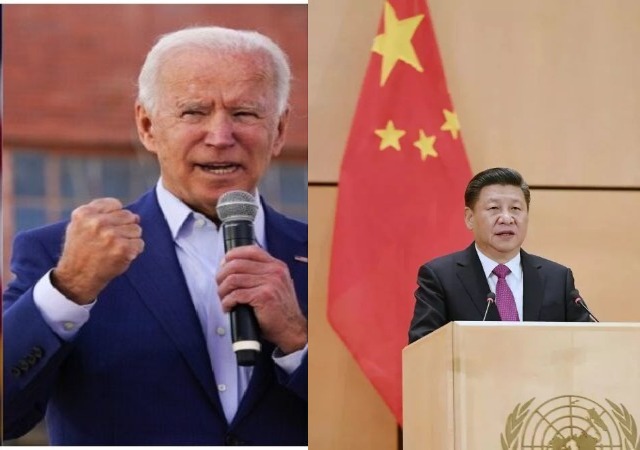
China Flies Warplanes to Taiwan, Tests Biden’s Foreign Policy.
Two large formations of warplanes were sent close to the island of Taiwan, a self-governing island, that Beijing claims belongs to mainland China.
Over the weekend, the muscle flexing by China’s military presents a significant foreign policy challenge to new United States President Joe Biden just days into his new administration.
The Taiwan’s Defense Ministry confirmed, 13 Chinese planes entered the southwestern portion of the island’s air defense identification zone (ADIZ) on Saturday followed by 15 on Sunday, prompting Taipei to scramble fighter jets to monitor the Chinese planes.
The ADIZ is defined as “a designated area of airspace over land or water within which a country requires the immediate and positive identification, location, and air traffic control of aircraft in the interest of the country’s national security.”
The Taiwan’s Defense Ministry,says, Chinese military planes made more than 380 flights into the Island’s air defense identification zone last year.
The timing of the Chinese flights and their use of fighter jets and bombers appeared intended to send a message to Biden after the former Administration constantly opposed China’s oppressive moves towards Taiwan.
In a statement Saturday, the Biden administration urged Beijing to stop trying to intimidate Taiwan.
“We urge Beijing to cease its military, diplomatic, and economic pressure against Taiwan and instead engage in meaningful dialogue with Taiwan’s democratically elected representatives,” US State Department spokesman Ned Price said, adding that US-Taiwan ties are deepening and Washington remains committed to the island’s self-rule.
Beijing claims full sovereignty over Taiwan, a democracy of almost 24 million people located off the southeastern coast of mainland China, despite the fact that Taiwan has been governed separately for more than seven decades.
China’s President, Xi Jinping has vowed that Beijing will never allow the island to become independent and has refused to rule out the use of force if necessary.
However, during Trump’s administration, the US approved the sale of advanced military hardware to Taiwan, including F-16 fighter jets, while sending high-level envoys to the island, both moves that angered Beijing.
Taiwan’s de facto ambassador to the US, Hsiao Bi-khim, attended Biden’s inauguration last week, a show of support to the new US president – the first such official invitation to a representative of the Taipei government since 1979, when Washington established formal diplomatic ties with Beijing.
Besides supporting Taiwan, the State Department spokesman Price said on Saturday that Washington would also stand with other Indo-Pacific friends and allies, as China ramps up its military activities in the region.
Over the weekend, US Navy aircraft carrier strike group entered the South China Sea the first deployment during the Biden administration of one of the 100,000-ton warships with its contingent of more than 60 aircraft.
A US Navy statement said the carrier USS Theodore Roosevelt and its guided-missile cruiser and destroyer escorts were on a scheduled deployment to uphold freedom in the South China Sea, almost all of which China claims as its sovereign territory.
Rear Adm. Doug Verissimo, commander of Carrier Strike Group Nine, said in a statement:
“With two-thirds of the world’s trade traveling through this very important region, it is vital that we maintain our presence and continue to promote the rules-based order,”



